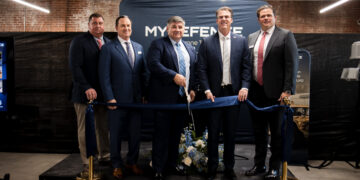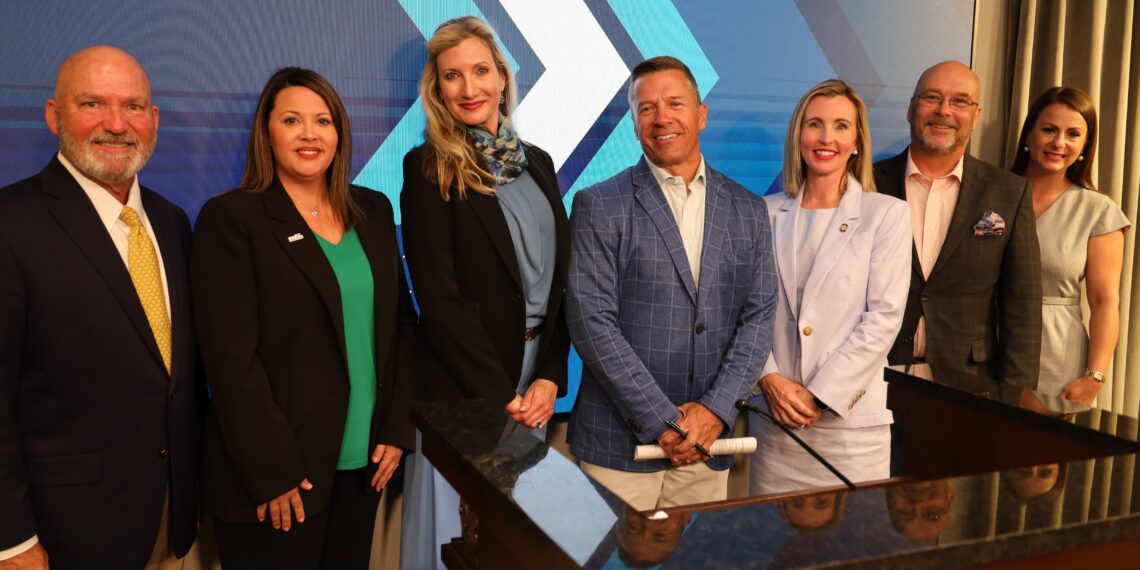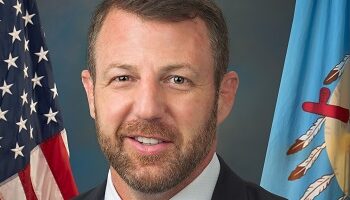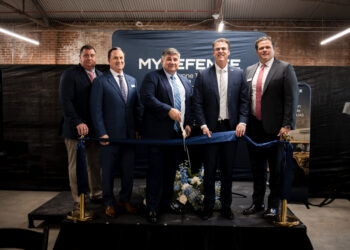OKLAHOMA CITY (OBV) – Business, political and economic leaders gathered at the Oklahoma State Capitol to celebrate the passage of two corresponding new laws that seek to revitalize the state’s economic development by maximizing business recruitment and retention efforts.
State Chamber of Oklahoma President and CEO Chad Warmington hosted the press conference at the capitol. He was joined on stage by the authors of Senate Bill 1447 and House Bill 3252, Sen. Kristen Thompson, R-Edmond, and Rep. Mike Osburn, R-Edmond, as well as Christy Gillenwater, president and CEO of the Greater OKC Chamber of Commerce, Charlene Flanery of Select Oklahoma and Mark Funke from the Oklahoma Business Roundtable.
Gov. Kevin Stitt signed both bills into law earlier this month. The State Chamber championed both bills in their ongoing effort to grow the state’s economy through business development. The Chamber succeeded last year when Senate Bill 621 was signed into law, which created the Oklahoma Workforce Commission. The Chamber vigorously advocated for that bill as part of its workforce development initiative.

Economic development and workforce development are both needed to make Oklahoma a competitive business state and top destination for major companies looking to expand, according to Warmington.
“Fixing workforce and economic development are critical to the growth that we say we all want to have. We want to have this great economy. You have to address the workforce ecosystem, and you have to address the economic development that goes hand in hand with it,” Warmington said. “When we started looking at modernizing our approach to workforce development, it was very clear from all of our standpoint that you had to also begin to look at how you were going to modernize economic development, again, because they go hand in hand.”
Warmington, Thompson, Osburn and economic experts worked together last summer to build a plan for restructuring economic development into an entity that would be singularly focused on compelling companies to expand into Oklahoma, as well as better supporting companies already in the state so to retain those companies.
“We looked at what other states were doing. We retained a consultant and spent a lot of time discussing what’s the best way to structure Oklahoma’s economic development system,” Warmington said. “And again, it couldn’t have been, wouldn’t have been possible without the legislative leadership and the economic development expertise that we have up here today.”
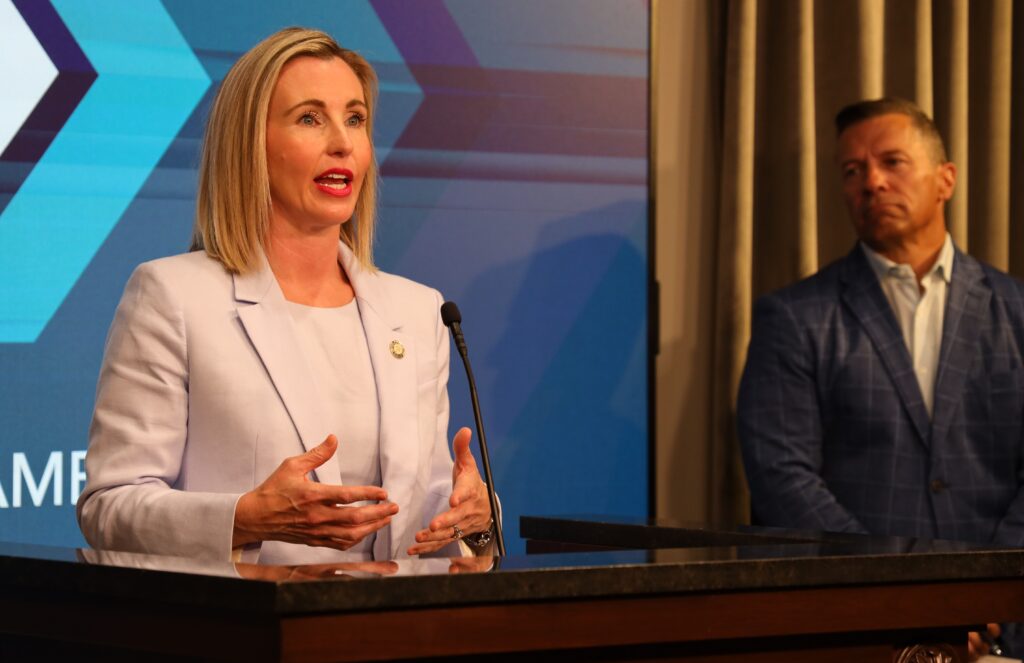
SB 1447 establishes the Oklahoma Office of Economic Development, Growth and Expansion (OkEDGE) and the Division of Community Outreach and Revitalization Enterprise (CORE) within the Oklahoma Department of Commerce. The bill also creates a legislative committee to review certain incentive packages for relocating or expanding businesses.
“Senate Bill 1447, also known as The COMPETE Act, is groundbreaking legislation for Oklahoma. It focuses on fostering innovation and supporting small businesses, using a targeted approach to attracting new industries to our state,” said Sen. Kristen Thompson. “By providing a systematic and strategic framework for economic growth and revitalization, we are laying a solid foundation for entrepreneurship and economic dynamism, without any additional cost to taxpayers.”
HB 3252 modifies the functions and programs of the Oklahoma Department of Commerce to ensure its focus is on economic development and community development.
“Over the years, like most other organizations, the Department of Commerce has experienced some mission creep. HB 3252 works in conjunction with SB 1447 to refocus the Department of Commerce on what it was chartered to do… grow, develop, expand, nurture, and support the Oklahoma economy and Oklahoma business,” said Rep. Mike Osburn.
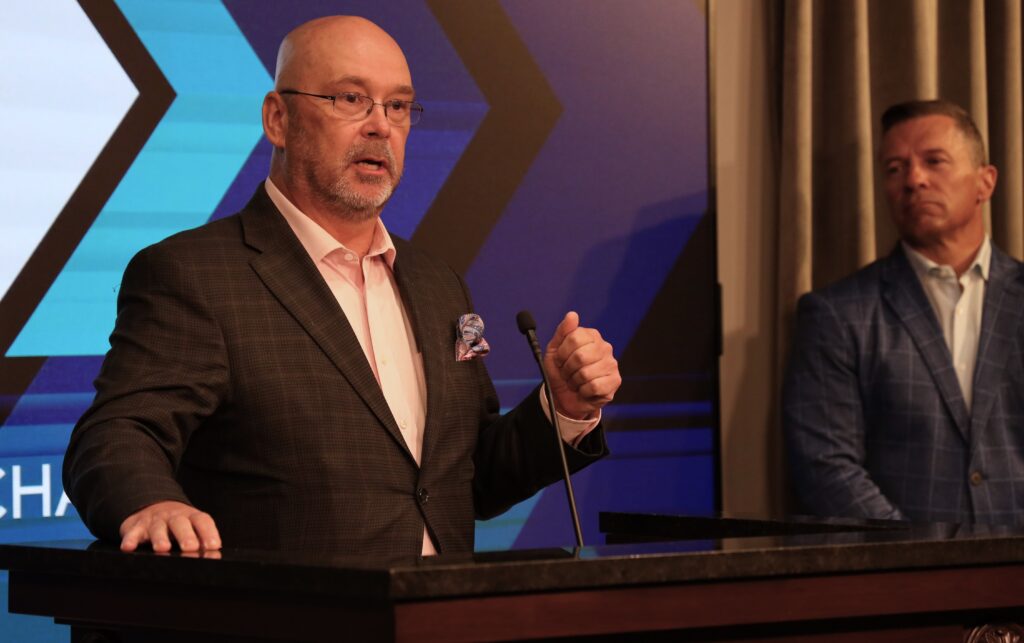
OkEDGE will serve as the state’s leading entity in matters pertaining to economic development, with a focus on recruiting companies to either expand or start in Oklahoma, as well as retaining companies that already exist in Oklahoma. Its duties will be as follows:
- Being empowered to strategically drive opportunities for economic growth and diversification across the state;
- Collaborating with local, regional and state entities;
- Coordinating the funding and investment activities of each element of the state’s economic development efforts and marketing campaigns to achieve better results for the state’s recruitment and retention of businesses; and
- Acting as the principal point of contact regarding investment in this state for public officials, businesses and the public.
CORE will focus on the long-term development of local communities to increase competitiveness and enhance economic opportunities. CORE’s duties will pertain to local economic opportunities and economic development, including, but not limited to the following:
- Creating new and higher-quality jobs for the people of the state through long-term development of local communities;
- Maintaining communication of information between the department and communities through regional organization and representaiton;
- Carrying out policy development and research in support of the long-term competitiveness of this state;
- Providing technical assistance to local communities in securing federal funding, incentive availability and community development;
- Providing assistance and funding in development of potential sites for economic development;
- Coordinating with other state agencies deploying federal and state funds for infrastructure development including, but not limited to, the Department of Transportation, the Oklahoma Water Board and the Oklahoma Broadband Office; and
- Assisting in compliance with the laws and regulations of economic incentives and economic development initiatives.
The original version of SB 1447 envisioned an entity that worked within the Department of Commerce, but was solely focused on economic development through business retention and recruitment. The entity would have been managed by a board of directors.
The bill was amended, with changes making OkEDGE part of Department of Commerce operations and scrapping the board of directors. The amended version of the bill added CORE to focus on developing Oklahoma communities so to make them more desirable for companies to remain in.
Osburn and Thompson said the essence of SB 1447 remains the same, with OkEDGE and CORE cooperating through unique functions to grow the state’s economy.
“They’ll be two separate divisions so that each division can be laser-focused on what it is that they do. The business recruiting and retention will be laser-focused on business recruiting and retention, and the community development side of things, which is kind of the rest of what Commerce does, can be laser-focused on that,” Osburn said. “They will work together, but they will have their singular focus, and I think that will work out way better.”
HB 3252 was originally written to modernize the Department of Commerce’s statutory duties. It modified the department’s mission statement and duties and the state’s five-year economic development plan. It also ended the Commerce Department’s tenure as Oklahoma’s official liaison agency for strategic economic development and business recruitment, instead making Commerce a technical assistance resource for local communities seeking federal funding opportunities.
Those efforts will remain within Commerce, but be focused through CORE.
Thompson and Osburn developed the idea of OkEDGE after major companies, including Panasonic, Tesla and Volkswagen, chose to not build factories in Oklahoma. The entity will work to dissuade major companies from leaving Oklahoma. Michelin representatives announced late last year that the company was closing down its factory in Adrmore, which employed around 1,400 Oklahomans.
OkEDGE will work to ensure that no other companies choose to leave Oklahoma.
Lt. Gov. Matt Pinnell fully supported Thompson and Osburn in their development of the legislation.
“This is not legislation that we just put together over the last couple of weeks. It has been a nine, 10 month process of talking to stakeholders across 77 counties, rural, urban, pulling in legislators from day one, not day five, not day 10, not two months into the process, but having the legislative bodies obviously there at the beginning of the process,” Pinnell said earlier this year. “I think it has prepared us to be very successful this legislative session to get this legislation across the finish line.”





